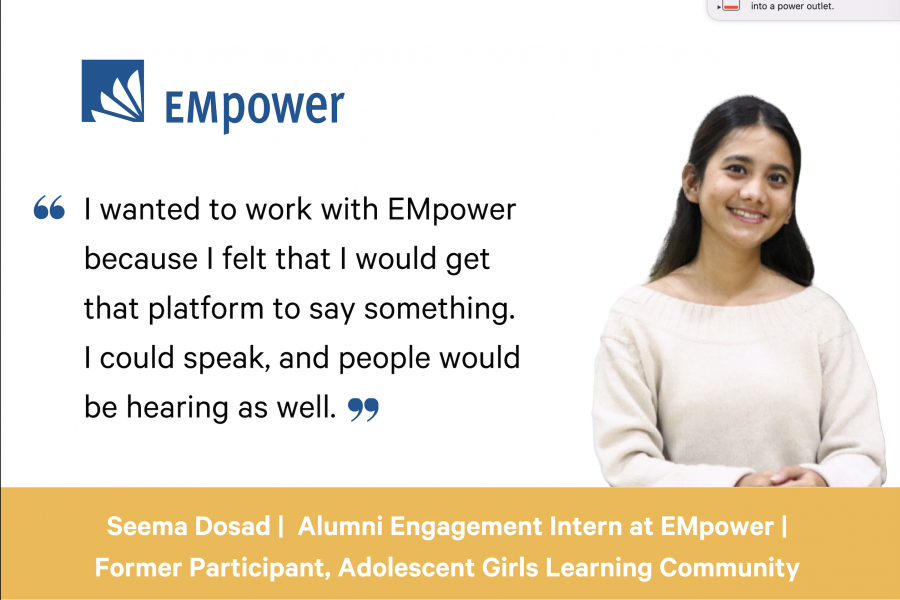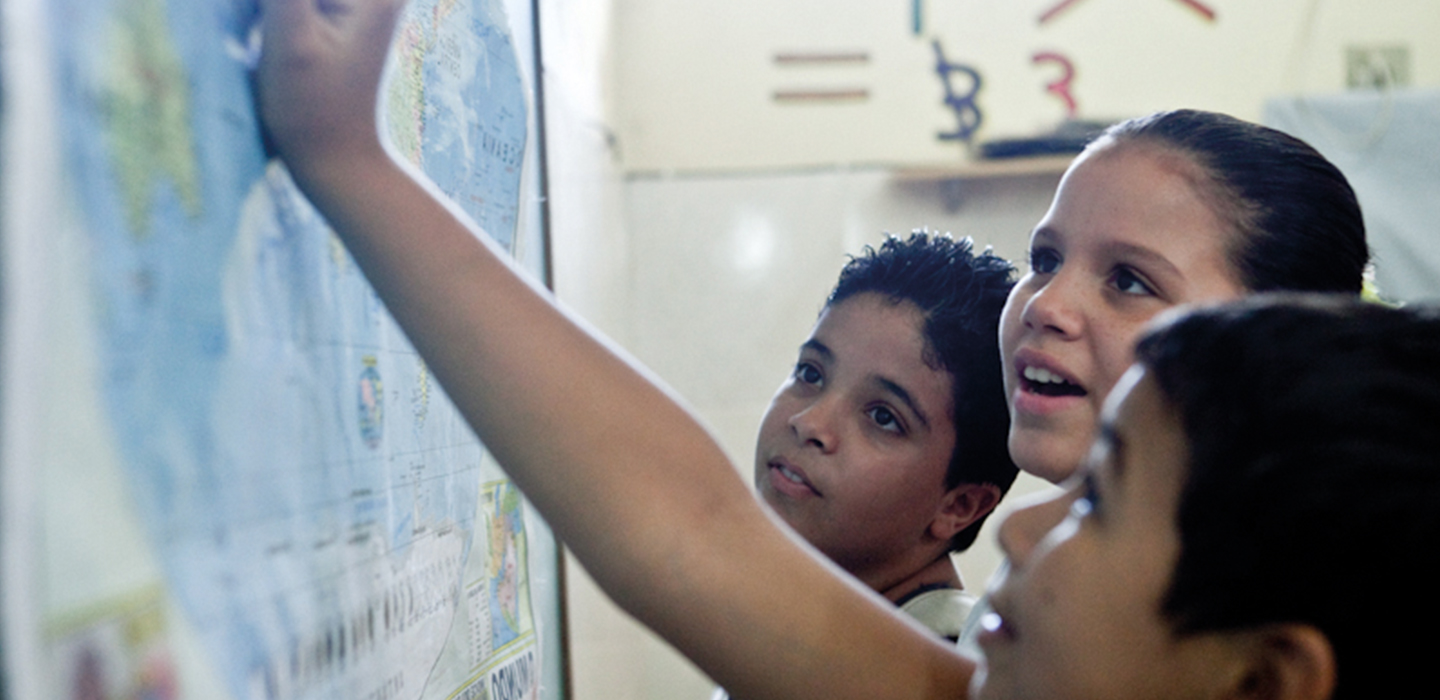Latest News
A Word with Seema Dosad
Posted 18 October 2023 in EMpower News | Share

On International Day of the Girl, EMpower’s President & CEO Cynthia Steele spoke with Seema Dosad, who was an early participant in our Adolescent Girls Learning Community in Mumbai and has been involved in our work with girls in India ever since. They spoke about what drew her to EMpower, what inspires her, and how organisations can better involve girls in their programmes and decision-making.
Seema, it could not be more perfect to interview you on International Day of the Girl! You have been involved with EMpower for many years, first in the Adolescent Girl Learning Community, then with the Girls Advisory Council, and now you're leading our work to connect with alumnae of our girls’ programmes. I'm curious to know how your life has changed by being involved in this work.
Firstly, it has been a long journey, but a beautiful one. I didn't believe it would happen this way. Back in 2012 when I was in 7th grade, I didn’t think I would be a part of an NGO and continuously be in a critical position. When I joined EMpower, it was something for me to learn. Then I started realising it is not just learning, it is also putting your voice forward with all the girls and understanding what others feel as well—especially in terms of what girls are feeling from different regions. When the Learning Community started in 2012, there were around eight NGOs that I came in contact with. I realised that whatever issues I have been talking about, it wasn't that different to other girls.
The issues were the same, the impact was the same, but the way it was happening was different in urban and rural areas. That was an eye opener for me. It depends on the geography; it depends on your surroundings. I started learning a lot of things about girls and also how social factors are involved. Then slowly we started acting rather than just discussing and listening. We created a lot of safe places to raise awareness, we conducted rallies, we conducted focus group discussions with the girls and also the community.
Then the GAC (Girls Advisory Council) came into existence in 2018, and that was a chance for me to come out of my own community and be a representative on a state level, on a national level. There were girls from different states there. When I went to Delhi it was again a very good learning experience for me because there were mentors, there were girls from different states who were guiding me. And I was sharing my knowledge as well.
EMpower put us girls at the forefront and made us the decision-makers. EMpower always talks about its girls-led initiatives, and it has been proving it as well. For me, these have been very important programmes. Being part of them and leading the Alumnae Engagement Programme, getting to connect with other girls, this is part of my journey and it’s exciting to go forward with EMpower.
I am fascinated that you set your sights long ago on someday working with EMpower, and lo and behold, that's happening! How did you come to that clear vision and to set an intention to get there?
The main thing was EMpower’s initiative was always girl-led. It was not for the sake of just saying it was girl-led, but we girls got opportunities to speak and make decisions. EMpower gave us chances to be the decision-makers. I'm seeing a lot of NGOs who are just claiming that youth are a part of the organisation. Girls’ voices should come forward, but what is coming forward is their voices, not the girls’ voices.
Initially, whenever I used to come for any workshop that was going on in the Learning Community, I used to tell everyone that one day I'll be a mentor: I will be teaching girls. I wanted to work with EMpower because I felt that I would get that platform to say something. I could speak, and people would be hearing as well, and hearing in a positive manner, too. I really felt that I wanted to get engaged in this work.
Even after I shifted [moved] from Mumbai, EMpower always reached out, and I was in touch with them. My parents used to say, “You're so much engaged with EMpower. They are doing so much for you. You're going to different states, you have gone on flights for the first time. They are giving you so much opportunities, so be engaged with them. It will be good for you.” And I told them that, yes, this is something that I want to do!
I want to give you the microphone: what do you wish adults better understood about creating spaces and opportunities for girls to lead?
The main part of my answer lies in your question itself, which is to focus on girls. I believe that organisations and people should stop paraphrasing what girls are saying, rather than putting their actual words. If I am saying something in Hindi: Mujhe lagta hai rape band hona chahiye, (“I think rape should be stopped”), put that forward; don't paraphrase it into two to three lines and then say, “Okay, there's a girl saying this.” The actual feeling or the emotion of the girl which lies in the wording won't come forward. Words and voices of the girls should come, and organisations should make sure that they are giving a platform to them. And that girls are not only a part of that programme, but they are getting the chance to make the final decision. This is something that I would like all these organisations to do.
EMpower is actually doing this. And because it is, when I'm into this alumnae engagement, there's not even one girl who denies to be a part or says they don’t have time. Maybe because of these works and the importance given by EMpower to girls, girls are ready to manage their time to participate, ready to do extra hours of work with EMpower.
I agree—enable girls’ authentic voices and views! Is there any final thing that you wanted to add?
One thing I can suggest in terms of EMpower funding local organisations in India, and other countries—and I believe that you are already doing it—is to see whether the organisation is actually working with girls or not. And how are they working to get a different understanding of how to involve girls in their programme? Are they being the decision-makers? If there's a workshop or something conducted in their organisation, is it something what girls want, or is it something the organisation wants to conduct? If girls want a workshop on menstruation awareness, if girls want a workshop on something skill-based, are they getting that or something that the organisation is focusing on? I think there should be a distinction between what girls want to learn and what the organisation wants them to learn.
That's very important: don't assume that the programme knows what girls want without directly asking them. Then act on their input. Thank you, Seema!
View All NewsMore Latest News
- We are Hiring: Programme Consultant, Peru
- Posted 23 April 2024
- A Word with Prarthana Kumar
- Posted 16 April 2024
- Finding the Power
- Posted 16 April 2024
Upcoming Events
Connect with EMpower
Stay up-to-date on the latest EMpower news, highlights from our grantee partners, upcoming events, and more.
Make a Difference with EMpower
Our Board Directors and the Leadership Council underwrite all of our Management, General and Fundraising expenses, so 100% of your donation goes directly to empowering marginalised young people.

